Antibody data
- Antibody Data
- Antigen structure
- References [1]
- Comments [0]
- Validations
- Immunocytochemistry [3]
- Immunohistochemistry [1]
- Other assay [2]
Submit
Validation data
Reference
Comment
Report error
- Product number
- PA5-21670 - Provider product page

- Provider
- Invitrogen Antibodies
- Product name
- GSTA2 Polyclonal Antibody
- Antibody type
- Polyclonal
- Antigen
- Recombinant full-length protein
- Description
- Recommended positive controls: HepG2. Predicted reactivity: Pig (82%), Rhesus Monkey (92%). Store product as a concentrated solution. Centrifuge briefly prior to opening the vial.
- Reactivity
- Human, Rat
- Host
- Rabbit
- Isotype
- IgG
- Vial size
- 100 μL
- Concentration
- 1 mg/mL
- Storage
- Store at 4°C short term. For long term storage, store at -20°C, avoiding freeze/thaw cycles.
Submitted references Glutathione S-transferase A2 promotes hepatocellular carcinoma recurrence after liver transplantation through modulating reactive oxygen species metabolism.
Ng KT, Yeung OW, Lam YF, Liu J, Liu H, Pang L, Yang XX, Zhu J, Zhang W, Lau MYH, Qiu WQ, Shiu HC, Lai MK, Lo CM, Man K
Cell death discovery 2021 Jul 21;7(1):188
Cell death discovery 2021 Jul 21;7(1):188
No comments: Submit comment
Supportive validation
- Submitted by
- Invitrogen Antibodies (provider)
- Main image
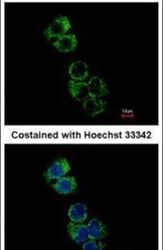
- Experimental details
- Immunofluorescent analysis of glutathione S-transferase alpha 2 in methanol-fixed Hep G2 cells using a glutathione S-transferase alpha 2 polyclonal antibody (Product # PA5-21670) at a 1:500 dilution.
- Submitted by
- Invitrogen Antibodies (provider)
- Main image
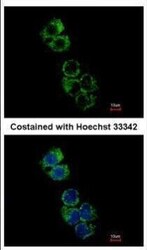
- Experimental details
- Immunofluorescence analysis of methanol-fixed Hep G2, using GSTA1/GSTA2/GSTA3 antibody (Product # PA5-21670) at 1:500 dilution.
- Submitted by
- Invitrogen Antibodies (provider)
- Main image
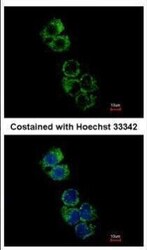
- Experimental details
- Immunofluorescence analysis of methanol-fixed Hep G2, using GSTA1/GSTA2/GSTA3 antibody (Product # PA5-21670) at 1:500 dilution.
Supportive validation
- Submitted by
- Invitrogen Antibodies (provider)
- Main image
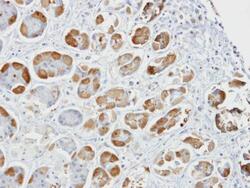
- Experimental details
- Immunohistochemical analysis of paraffin-embedded human stomach, using GSTA1/GSTA2/GSTA3 antibody (Product # PA5-21670) at 1:100 dilution. Antigen Retrieval: EDTA based buffer, pH 8.0, 15 min.
Supportive validation
- Submitted by
- Invitrogen Antibodies (provider)
- Main image
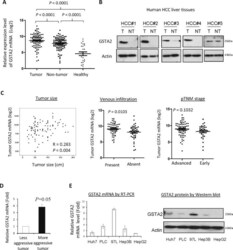
- Experimental details
- Fig. 4 The expression significance of GSTA2 in HCC. A Expression of GSTA2 mRNA in the tumor (T) and non-tumor (NT) liver tissues of HCC patients, and in the liver tissues of healthy donors. B Western blot analysis of GSTA2 protein in paired tumor (T) and non-tumor (NT) tissues of HCC patients. C The correlation analysis of the expression level of tumoral GSTAs mRNA and tumor size, the presence of venous infiltration, and pTNM stage of HCC patients. D The expression level of tumoral GSTA2 mRNAs between less aggressive and more aggressive tumors after liver transplantation in rats. E The expression of GSTA2 mRNA and protein among different HCC cell lines.
- Submitted by
- Invitrogen Antibodies (provider)
- Main image
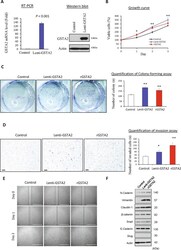
- Experimental details
- Fig. 5 Overexpression of GSTA2 promoted HCC growth and invasion. A The expression level of GSTA2 mRNA and protein in GSTA2-overexpressing HCC cells. B MTT assay of HCC cells after endogenously overexpressing GSTA2 by lentivirus (Lent-GSTA2) or administrating human recombinant GSTA2 protein (rGSTA2). C Colony-forming assay. D Matrigel invasion assay. Scale bar: 200 muM. E Wound healing migration assay. Scale bar: 1000 muM. F Western blot analysis of EMT-associated proteins.. Control, Hep3B-control cells; Lenti-GSTA2, Hep3B-LentiGSTA2 cells; rGSTA2, human recombinant GSTA2 protein. * P < 0.05; ** P < 0.01.
 Explore
Explore Validate
Validate Learn
Learn Western blot
Western blot Immunocytochemistry
Immunocytochemistry